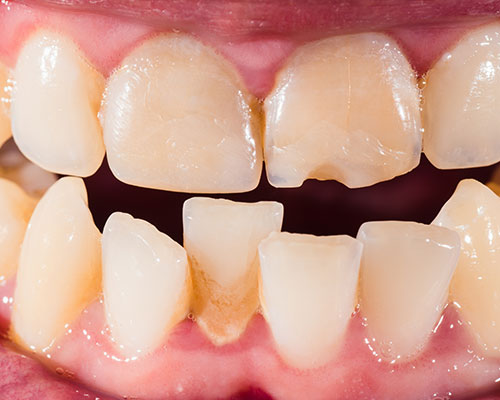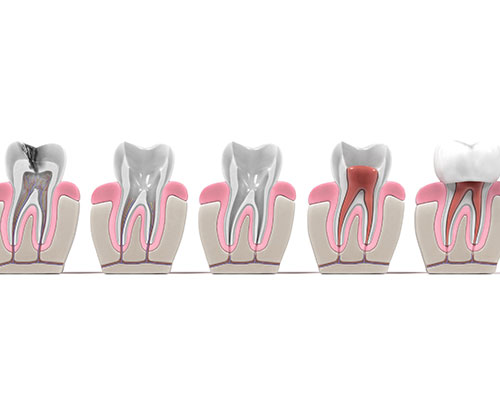Endodontics, or root canal treatment, is now considered as routine as getting a filling – so it’s nothing to fear if your dentist at Churchview Dental Practice recommends it for you. If you’re experiencing toothache, swelling, and sensitivity to hot and cold, it may be that the inner soft tissue of your tooth – or dental pulp – has become infected due a trauma or deep decay. A root canal treatment eliminates the pain instantly, clearing the infection and sealing the inside of your tooth to prevent re-infection. A dental crown is often required afterwards, to strengthen and restore tooth function. If you are experiencing sudden toothache, contact Churchview Dental Practice immediately – and let us show you just how gentle a root canal procedure can be.
ENDODONTICS
Gentle root canal treatment in Doncaster
Endodontics in Doncaster
Root canal: causes and symptoms
Deep inside each tooth is a mixture of blood vessels and nerves – the attractively named ‘pulp’. This can become infected in a number of ways – through tooth decay and gum disease, for example; through injury or cracking; or through stress caused by repeated treatments. Broken crowns and damaged fillings are also major culprits. The symptoms? Well, there’s no denying that it’s painful, particularly in response to hot and cold, and the infected pulp often creates an abscess. The tooth may also appear discoloured, which indicates permanent nerve damage. If left untreated, the infection can spread to the jaw and require complete removal of the tooth.

FAQs
What exactly is a root canal?
The root of a tooth contains a bundle of soft tissue and nerve endings known as dental pulp. If tooth decay penetrates this far, the dental pulp becomes infected and can cause severe toothache – sometimes even a tooth abscess.
Why would I need root canal treatment?
The causes of tooth infection are varied – deep decay due to cavities or gum disease, cracked fillings or crowns, and damage as a result of trauma, or even teeth grinding. Whatever the reason, a root canal treatment will prevent the need for tooth extraction and future costly treatments.
What are the symptoms?
Root canal symptoms often come in two waves. When the pulp becomes infected, early signs that you might need endodontic treatment include toothache, sensitive teeth to hot and cold foods, and pain when eating and drinking. When the infected pulp dies, these symptoms may temporarily subside – but don’t be tempted to put off seeing your dentist! When the infection spreads to the root canal, those early symptoms come back – this time accompanied by pain and swelling to the face and gums, and pus around the infected tooth, which will often appear dark in colour. In this scenario, contact the practice immediately for an emergency dentist appointment.
What does the root canal procedure involve?
Root canal treatment is carried out under local anaesthetic and is usually a straightforward procedure, rather like getting a filling. Once the tooth is completely numb, the dentist will use a series of tiny instruments to open up the tooth and extract the infected pulp. The remaining space is cleaned and shaped, ready for filling with a rubbery substance called gutta-percha. A temporary filling is usually placed on top – the permanent restoration would be carried out in a separate appointment.
Will I need to take time off work for a root canal?
You can carry on as normal once the anaesthetic has worn off, though the full healing period will take around a week – just be careful with what you eat, how you chew and maintain an excellent oral hygiene routine.

